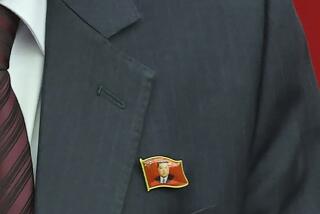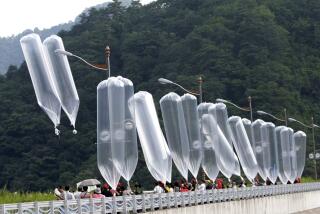For N. Korea’s Kim, Actions Fall Silent to Proverbs
- Share via
SEOUL — SEOUL -- North Korea has a huge army on its side of the demilitarized zone, but also it wages its cold war with the South and its U.S. patron with words. And often its weapon of choice is proverbs.
A puppy challenging a tiger. A tortoise picking a fight with a dragon. And a mutt yapping at a caravan passing through a village. All are characters in centuries-old Korean proverbs that belittle those who take up a challenge beyond their means.
But North Korea -- so poor it cannot feed its people without foreign aid -- flips their meaning. In describing its relationship to the United States, the insular communist state casts itself as the tiger and the dragon, while the superpower is the puppy and the tortoise.
While North Korea’s state-run media carry Cold War-era references to “flunkyist reactionaries” and “imperialist warmaniacs,” they also draw on proverbs and idioms that were around long before Marxism came to Korea in the 20th century.
When President Bush labeled North Korea part of an “axis of evil” with Iran and Iraq in January, the regime in Pyongyang ridiculed the American leader as a “puppy knowing no fear of the tiger.”
That phrase comes from a Korean proverb: “A one-year-old puppy doesn’t fear the tiger.” An equivalent expression in English is, “Fools rush in where angels fear to tread.”
North Korea churns out tough rhetoric daily through the Korean Central News Agency, its mouthpiece to the outside world. The combativeness of the North’s statements cycles up and down with the political mood on the Korean peninsula, but colorful language is a constant in KCNA’s English-language statements.
It compares U.S. troops in joint military exercises with South Korea to “fools rushing into a fire with hay bundles on their backs.” It condemns American “imperialist aggressors” by citing an old proverb: “The village is never safe as long as rabid dogs are running amok in the neighborhood.”
Taking a shot at Japan, the former colonial occupier of the peninsula, North Korea often says: “No matter how hard it tries, a crow can never become a pigeon.”
In 1999, when negotiators from the two Koreas met to arrange a historic inter-Korean summit for the following year, smiling North Korean delegates started off the talks with proverbs.
“We can’t fill our stomach with the first spoon, but we must remember that a thousand-mile journey starts with the first step,” they said, mixing their metaphors.
Proverbs also are used in messages to North Koreans, who have had a tough time the past decade as floods and drought devastated farming and brought on a famine that killed hundreds of thousands.
Northern newspaper commentaries and school textbooks often cite old expressions applauding the tenacity and daring of the underdog, says South Korea’s Yonhap News Agency, which monitors North Korean news media.
North Korea, for example, praises itself as “an ant trying to topple an oak tree,” the tree being the United States.
“Ordinary North Koreans are so isolated from the outside world that they don’t realize how unrealistic these analogies are,” said Kim Seung-cheul, a North Korean defector who is an analyst at Seoul’s Institute of North Korea Studies.
North Korean President Kim Jong Il, who inherited power and a personality cult from his late father, Kim Il Sung, is officially his country’s language maven.
“Proverbs are a convenient national heritage we can use to scoff at the enemy,” Kim was quoted as saying by South Korea’s National Intelligence Service.
Kim apparently inherited his flair for language from his father, who is credited with saying: “Capitalism is like weeds growing through the cracks of the pavement. Wherever there is a hole, it raises its ugly head.”
More to Read
Sign up for Essential California
The most important California stories and recommendations in your inbox every morning.
You may occasionally receive promotional content from the Los Angeles Times.










